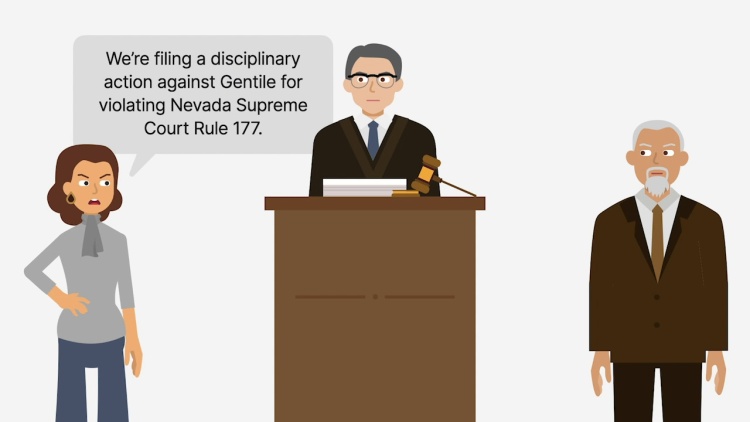Gentile v. State Bar of Nevada
United States Supreme Court
501 U.S. 1030 (1991)
- Written by DeAnna Swearingen, LLM
Facts
Dominic Gentile (defendant) was a criminal-defense lawyer licensed to practice in Nevada. Gentile represented Grady Sanders, a well-known Las Vegas businessman accused of stealing cocaine and money during a police sting operation. On the day of Sanders’s indictment, Gentile held a press conference proclaiming his client’s innocence and implicating a police detective as the guilty individual. Shortly after the press conference, a number of newspaper articles appeared discussing the press conference. Sanders was eventually acquitted on all counts. The Southern Nevada Disciplinary Board of the State Bar (board) (plaintiff) filed a disciplinary action against Gentile claiming that he violated Nevada Supreme Court Rule 177. That rule prohibited lawyers from making extrajudicial statements reasonably expected to be disseminated by public communication, if the lawyer knew or reasonably should have known that the statement would have a substantial likelihood of materially prejudicing an adversarial proceeding. Rule 177 also set out several specific types of statements that would violate the rule, including statements regarding the character, credibility, or reputation of a party or witness in the matter. The rule also contained a safe-harbor provision, which stated that notwithstanding the other provisions of the rule, a lawyer involved in investigating or litigating a matter could state, without elaboration, the general nature of a claim or defense in the matter. According to the board, Gentile knew or should have known that his statements at the press conference would materially prejudice Sanders’s trial. Gentile told the board that he decided to hold the press conference to counteract other prejudicial publicity in the matter and because the matter had taken a significant toll on Sanders’s health and his business. Gentile further testified that he thought his statements were protected by Rule 177’s safe-harbor provision; his statements at the press conference demonstrated that he had studied the rule in advance of the press conference and tried to comply with the rule by limiting the information he discussed at the press conference. The board found that Gentile violated Rule 177 and recommended that he receive a private reprimand. Gentile appealed, and the Nevada Supreme Court affirmed the board’s decision. The United States Supreme Court granted certiorari to review.
Rule of Law
Issue
Holding and Reasoning (Kennedy, J.)
Concurrence/Dissent (Rehnquist, C.J.)
Dissent (Kennedy, J.)
What to do next…
Here's why 907,000 law students have relied on our case briefs:
- Written by law professors and practitioners, not other law students. 47,100 briefs, keyed to 996 casebooks. Top-notch customer support.
- The right amount of information, includes the facts, issues, rule of law, holding and reasoning, and any concurrences and dissents.
- Access in your classes, works on your mobile and tablet. Massive library of related video lessons and high quality multiple-choice questions.
- Easy to use, uniform format for every case brief. Written in plain English, not in legalese. Our briefs summarize and simplify; they don’t just repeat the court’s language.






